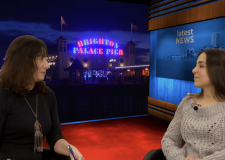Hove MP calls for life-saving change to the law
Hove MP Mike Weatherley is pushing for changes to the rules on organ donations.
He is due to take part in a House of Commons debate on the subject starting at 11am today (Wednesday 9 November) in Westminster Hall.
Last week he tabled an early day motion calling on the government to “look again at the feasibility of a UK-wide opt-out system of organ donation”.
His hope is that doctors will be able to presume that we consent to our organs being used for transplant surgery after we die unless we have specifically said otherwise.
The Conservative MP said that 511 patients died in Britain in the year to the end of March while waiting for an organ transplant.
He said that at the same time 7,800 patients were waiting for transplants.
He added that about 65 per cent of the public would be willing to donate an organ after their death but only 29 per cent were on the NHS Organ Donation Register.
And he said: “Too many people are dying while waiting for an organ transplant.
 “Clearly, the consequence of our current bureaucratic system is a chronic shortage of donors.
“Clearly, the consequence of our current bureaucratic system is a chronic shortage of donors.
“While there are enough people willing to donate, the opt-in system has clearly failed.
“I want an opt-out system brought in as soon as practically possible, as it will quite simply save countless lives.
His call was supported by prominent civic campaigner Valerie Paynter, 65, who runs Save Hove.
She said yesterday: “Today (November 7) marked the 20th anniversary of my own receipt of a kidney transplant.
“And today I coincidentally received the press release about an opt-out early day motion initiated by Hove MP Mike Weatherley.
“Ideally, people get dialysis while some kidney function remains. It makes a difference.
“I was instead snatched from the jaws of death with zero function (end-stage renal failure) and left in a really bad way because my GP at the time had not been on the ball at all.
“I was not going to survive on dialysis for long but I didn’t want a transplant either as I knew about all the pitfalls, problems and dangers from all the many, many weeks I had spent on the ward over the 18-month period I was on dialysis.
“Nevertheless I was on the list to have one. They were bloody well going to save me.
“On 7 November 1991 I came out of a lecture to a note in my pigeonhole at Sussex University asking that I call the renal unit and I knew exactly what that meant.
“They were adamant I would have it and two nurses drove out to the campus to collect me – Pam saying to me: ‘It’s a 7 out of 8 match. You are having it!’
“And I did and they were right to insist.
“There had been a run of deaths on the renal ward at the Royal Sussex County Hospital – some of them failed new transplants.
“A senior staff nurse was burning lavender oil in desperation to lift their mood.
“After first having a final dialysis, Michael Cohen from Eastbourne and myself had one kidney each from a man whose identity I have never known and always wanted to know.
“Our beds were side by side and we broke the spell.
“We were instant runaway successes and I will never, ever forget the beaming faces of the medical staff after their terrible month of losses – 11 people had died in one month.
“That’s quite hard on morale. They went silly with joy.
“I named the kidney Cedric. Weirdly, I knew it had come from a man before I was told.
“And I had a sense of him by the bed taking a keen interest in a baffled sort of way.
“Michael died two or three years ago. I am still here. Lucky me.
“Over my 18 months on dialysis I watched many of the others die, some after years and years and years on dialysis, waiting and hoping and dying without a transplant ever coming along.
“I had a serious vascular rejection episode and saw in the new year (1992) on the ward but I made it.
“Even if you are a signed-up donor, you have to be in the right condition to be used when you die and it has to be possible for medical staff to get permission to take organs fast enough to use them.
“Asking distraught relatives for bits of bodies is not easy. But the law requires it. Whatever your wishes.
“And maybe nobody with the rights over your body is available fast enough anyway and organs are lost that way.
“Organs from people with cancer and other diseases cannot be used either.
“The pool of organs from people who signed up to donor registers shrinks and shrinks in these various ways.
“I don’t know who my donor was or how he died but chances are it was a traffic accident – most transplant organs become available in that situation and are the healthiest and best apart from a living-person donation – family mostly.
“When I was on the waiting list in 1990-91 there were 1,500 of us waiting for transplants.
“Now the annual waiting list is nearly 8,000.
“The existing opt-in system is a net with big holes in it. Huge numbers of healthy, useful organs that dead people wanted to donate and don’t need any more fall through the holes in that system.
“I’m pretty seriously grateful for the life I have and I hope … every MP in the House of Commons will sign this early day motion.
“I’m baffled as to why we do not already have a system of presumed consent or deliberate opt-out.
“It takes everyone off the hook when a life is lost, removes doubt and all the emotional problems faced by families and medical staff who don’t like having to ask permission for organs or discuss it.”
She described herself as like Cinderella at the ball, knowing that midnight will come, but feeling privileged to have enjoyed 20 years with a successfully transplanted kidney.
She said: “Regrettably GPs were and remain under-educated and under-interested in renal diagnostics.
“In the summer of 1990 I watched a steady stream of people come on to the ward in end-stage renal failure as new patients, just like me.
“It is unacceptable. A scandal. I should have been monitored better and in the six months before I ended up nearly dying I went to my GP endlessly about the steady weight gain (fluid retention) and other symptoms.
“‘Change your diet and get more exercise,’ he would smile before dismissing me.
She said her life was saved when she called an out-of-hours doctor who forced the issue to ensure she had the necessary tests.
Now Valerie Paynter is supporting the campaign to give others in her situation a second chance to live.





















